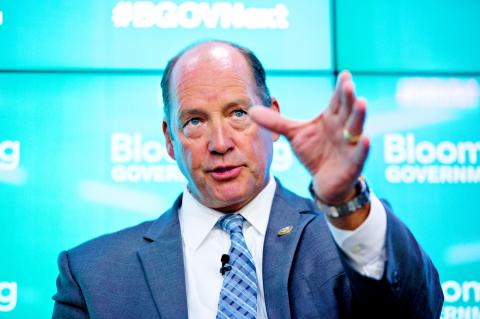US support for Taiwan to participate in next year’s World Health Assembly (WHA) meeting as an observer must be met with supporting action by the Taiwanese government, former Ministry of Health and Welfare representative to Geneva Chang Wu-hsiu (張武修) said.
Chang’s comments referred to the support of other subcommittee members regarding a bill introduced by US Representative Ted Yoho, who chairs the US House of Representatives Foreign Affairs Subcommittee on Asia and the Pacific. The bill was unanimously passed on Thursday.
The bill aims to improve the US strategy for promoting Taiwan’s participation in the WHO, and instructs the US secretary of state to report on the US Department of State’s efforts to obtain observer status for Taiwan at the WHA.

PHOTO: Bloomberg
Yoho said international health concerns should not be limited to national borders, and it was unfortunate that China has taken a shortsighted view and barred Taiwan from participating in international organizations.
Public health should not become an issue of political football and the US should continue to support Taiwan’s participation in the WHO, US Representative Gerald Connolly added.
Chang said that alternative methods of medical and health cooperation between Taiwan and the US should be explored.
“There are too many things that could be done,” Chang said. “Opportunity must be backed up with action.”
With Taiwan’s high standard of medical quality and wide healthcare coverage, it could cooperate with the US and other countries to make the nation more visible on the international stage, but such a commitment does not have to be centered around politics, Chang said.
Taiwan could offer medical training to other nations, develop a market for medical products, or even invest in hospitals abroad, expanding Taiwan’s renown and capability through actual work, he added.
The government and private sectors must ensure that Taiwan is invited to the next WHA, Taipei-based Foundation of Medical Professionals Alliance executive director Lin Shih-chia (林世嘉) said.
Meanwhile, the Ministry of Foreign Affairs thanked the subcommittee for its support, saying that such action was in line with constant support from the US administrative and legal branches supporting the nation’s participation in international organizations.
Support for the bill shows that support for Taiwan’s participation in international organizations transcends major political parties, the ministry said, adding that it would follow developments of the bill and lobby for support and aid from all bodies.
Taiwan had hoped to attend this year’s WHA in Geneva, Switzerland, from May 22 to May 31 as an observer, as it had done for the past eight years, but it did not receive an invitation because of opposition from China.
Taiwan first attended the WHA as an observer in 2009, a year after former president Ma Ying-jeou (馬英九) came to power and began pursuing a more conciliatory policy toward Beijing.
Taiwan’s exclusion was widely seen as part of China’s efforts to clamp down on Taiwan’s international participation, a strategy that has become more aggressive since President Tsai Ing-wen (蔡英文) came to power last year.
Additional reporting by CNA

The first two F-16V Bock 70 jets purchased from the US are expected to arrive in Taiwan around Double Ten National Day, which is on Oct. 10, a military source said yesterday. Of the 66 F-16V Block 70 jets purchased from the US, the first completed production in March, the source said, adding that since then three jets have been produced per month. Although there were reports of engine defects, the issue has been resolved, they said. After the jets arrive in Taiwan, they must first pass testing by the air force before they would officially become Taiwan’s property, they said. The air force

The Coast Guard Administration (CGA) yesterday said it had deployed patrol vessels to expel a China Coast Guard ship and a Chinese fishing boat near Pratas Island (Dongsha Island, 東沙群島) in the South China Sea. The China Coast Guard vessel was 28 nautical miles (52km) northeast of Pratas at 6:15am on Thursday, approaching the island’s restricted waters, which extend 24 nautical miles from its shoreline, the CGA’s Dongsha-Nansha Branch said in a statement. The Tainan, a 2,000-tonne cutter, was deployed by the CGA to shadow the Chinese ship, which left the area at 2:39pm on Friday, the statement said. At 6:31pm on Friday,

The Chinese People’s Liberation Army Navy’s (PLAN) third aircraft carrier, the Fujian, would pose a steep challenge to Taiwan’s ability to defend itself against a full-scale invasion, a defense expert said yesterday. Institute of National Defense and Security Research analyst Chieh Chung (揭仲) made the comment hours after the PLAN confirmed the carrier recently passed through the Taiwan Strait to conduct “scientific research tests and training missions” in the South China Sea. China has two carriers in operation — the Liaoning and the Shandong — with the Fujian undergoing sea trials. Although the PLAN needs time to train the Fujian’s air wing and

STRIKE: Some travel agencies in Taiwan said that they were aware of the situation in South Korea, and that group tours to the country were proceeding as planned A planned strike by airport personnel in South Korea has not affected group tours to the country from Taiwan, travel agencies said yesterday. They added that they were closely monitoring the situation. Personnel at 15 airports, including Seoul’s Incheon and Gimpo airports, are to go on strike. They announced at a news conference on Tuesday that the strike would begin on Friday next week and continue until the Mid-Autumn Festival next month. Some travel agencies in Taiwan, including Cola Tour, Lion Travel, SET Tour and ezTravel, said that they were aware of the situation in South Korea, and that group